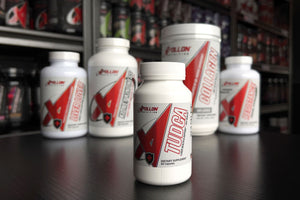
Muscle Dysmorphia is an Emerging Condition that Primarily Affects Male Bodybuilders
By Kimberly Goodhartz, LAC, NCC
Bodybuilding as a competitive sport has become increasingly popular throughout the past decade. It has come to my attention that there have been boundaries crossed on many occasions in regards to competitors viewing themselves in a distorted way.
First of all, let me introduce myself. My name is Kimberly Goodhartz and I have personally competed in both bikini and figure divisions. I have also been coaching the sport since 2015. Although fitness has taken a chunk of my identity, my number one role in life is that I am a Therapist. I am a Licensed Associate Counselor and I have my Master’s Degree in Mental Health Counseling from Monmouth University. I work for a practice based in Woodbridge, NJ where I work with clients ages 8 and up. The populations that I enjoy working with the most are addicts and those who suffer from eating disorders. I am going to explain in this article how both addiction and eating disorders can occur in this sport.
Now, back to bodybuilding and it's competitive nature. If you are a competitor, you know that you must work your hardest at the gym, dedicate your time to prepping meals, and for some competitors, even isolate yourself from most social situations where you may be too tired or want to avoid foods not on your diet plan. Even with all your hardest efforts, when you get on stage, you are still compared to all the other competitors who have also gone through a similar prep. Sometimes, your hard work is enough and you go home with a trophy. Sometimes you leave empty handed. Either way, you know that you must improve to do even better at your next show. This is where the trouble begins for many competitors. “Muscle dysmorphia is an emerging condition that primarily affects male bodybuilders. Such individuals obsess about being inadequately muscular. Compulsions include spending hours in the gym, squandering excessive amounts of money on ineffectual sports supplements, abnormal eating patterns or even substance abuse” (Mosley, 2008). Although Mosley explains that this primarily affects male bodybuilders, women are also affected in a similar manor.
While this does not affect all competitors, this is not the only sport where body dysmorphia and eating disorders occur. “Several sports and activities have been associated with an increased risk of eating disorders. Bodybuilding, a sport in which eating, body weight, and shape concerns appear to be prevalent, has grown considerably in popularity with prevalence estimates in excess of 5 million participants in America alone” (Goldfield, Harper, & Blouin, 2007). With a rise of competitors, there becomes a high demand for bigger muscles, leaner bodies, and more control over what is consumed by the competitor. In the course of several ongoing studies by Pope et. al in 2011, they have encountered men and women who display a form of body dysmorphic disorder in which they become pathologically preoccupied with their degree of muscularity. This condition, which the authors have tentatively termed “muscle dysmorphia,” may cause severe subjective distress, impaired social and occupational functioning, and abuse of anabolic steroids and other substances. “Epidemiological data suggest that muscle dysmorphia, though rarely recognized, may afflict substantial numbers of Americans” (Pope et. al, 2011).
As I have stated before, this does not affect all bodybuilding competitors. This sport in general tends to control the competitor's life and many can become carried away by becoming obsessive over the way their body looks. A non-competitor who may work out for health benefits could see a competitor in a completely different way than the competitor views themselves. This competitor may think that they are not lean enough, that they need to add muscle to their quads or lats, or that they need a new fat burner so that they will finally be happy with their body. This “controlling” nature can become pathological and “many bodybuilders and anorexic persons may be seen as “victims” of the extreme control of their bodies and of the contemporary construction of an ideal body image” (Michela Marzano-Parisoli, 2012).
Another huge factor in the distorted way a competitor may view themselves is to compare their stage-ready body to their off-season physique. The off-season is for growing and it is also a much needed break from the physical and psychological demands of show prep. This weight gain may not always be simply muscle. In order for a competitor to grow, fat is also necessary in a psychologically balanced diet. While many male competitors do stress about gaining fat, female competitors stress as well. Social media has played a role in distorted views of one's physique. While not all photos may be enhanced with Photoshop or other editing tools, the angle in which a photo is taken, or the time of day the photo is taken may cause distress.
It is important for both competitors, and gym goers alike to understand that it is easy to become addicted to the chase of a perfect body. It is important for competitors to know that hiring a coach who can monitor your diet and your well-being is what is best for your success. It is important for competitors to know that it is normal to put on weight after a long prep. It is important for competitors to know that it is OK to learn to love your body at all stages of contest prep and off-season. Set boundaries for yourself and know that if you or a friend are suffering from any psychological distress, it is OK to reach out for help from a professional. That is what we are here for! For everyone who is starting their off-season, enjoy that cookie and relax with your feet up. You earned it.
Goldfield, G., Harper, D., & Blouin, A. (2007, June & july). Are bodybuilders at risk for an eating disorder? Retrieved August 30, 2017, fromhttp://www.tandfonline.com/doi/abs/10.1080/10640269808251249
Michela Marzano-Parisoli, M. (2012, April). The Contemporary Construction of a Perfect Body Image: Bodybuilding, Exercise Addiction, and Eating Disorders. Retrieved August 30, 2017, from http://www.tandfonline.com/doi/abs/10.1080/00336297.2001.10491741
Mosley, P. E. (2008, September 01). Bigorexia: bodybuilding and muscle dysmorphia. Retrieved August 30, 2017, from http://onlinelibrary.wiley.com/doi/10.1002/erv.897/full
Pope, H., Jr., Gruber, A. J., Philips, K., & Choi, P. (2011, May & june). Muscle Dysmorphia: An Underrecognized Form of Body Dysmorphic Disorder. Retrieved August 30, 2017, from http://www.sciencedirect.com/science/article/pii/S0033318297714002

